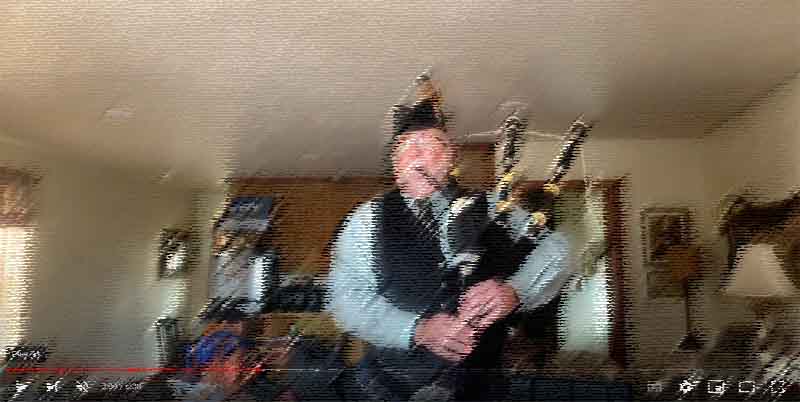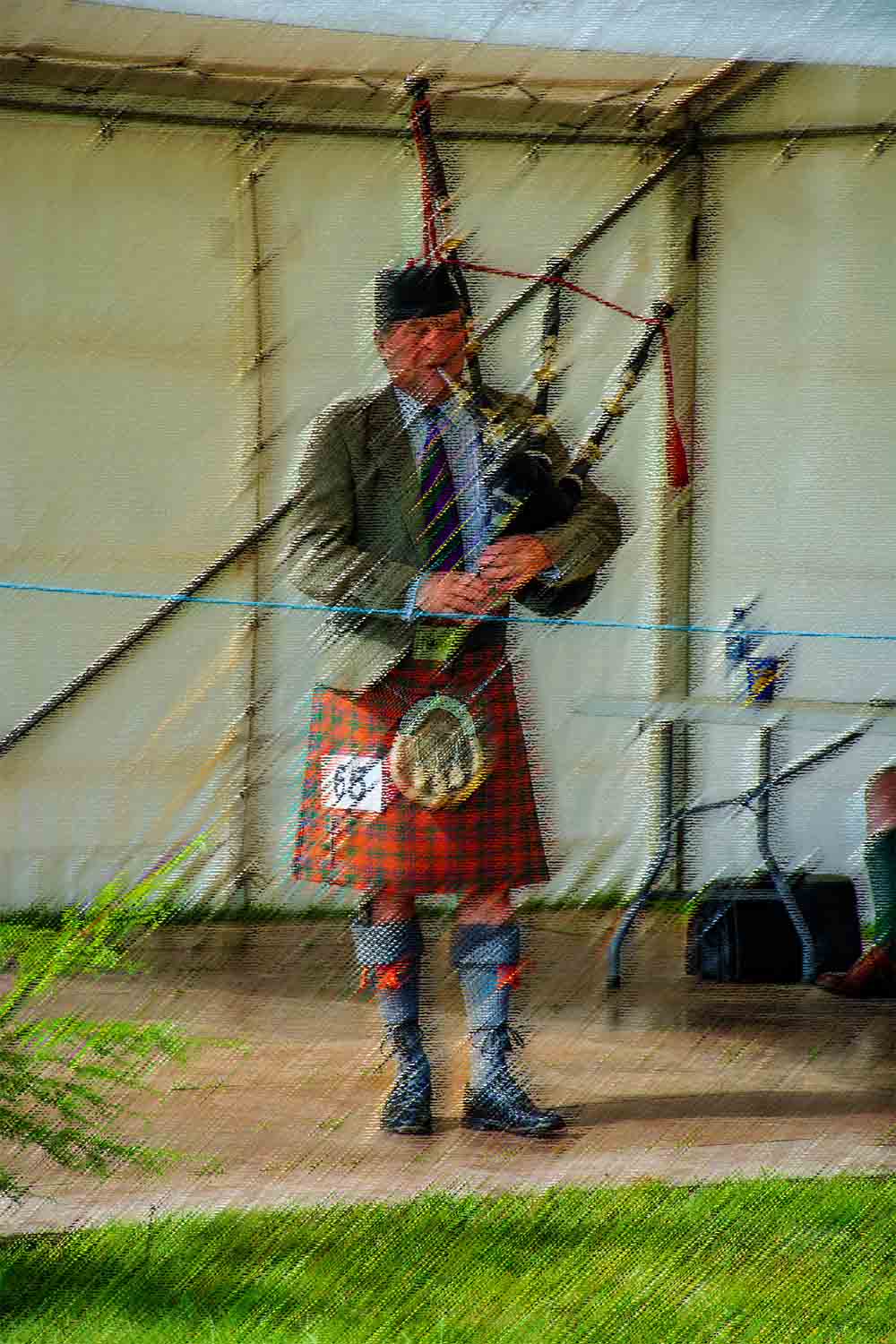The here and now: weighing online competitions with live events
By Joshua Hogg
Covid-19 and lockdown: a period in piping and drumming history that most of us would rather forget, and one from which we are still not quite free.
It brought the world as we know it to an abrupt stop to wait out the virus. Here in South Africa the three weeks of hard lockdown were followed by various levels of restriction that have slowly eased over the past 26 months.
With public life quickly snuffed, we and the rest of the world went online in a bid to keep connections alive. The pipe band world showed some resilience in places, with daring ideas brought to the table, not the least of which was online solo competitions. The first of its kind for South Africa was the Pipe Band Association of South Africa’s “For the Record,” which saw competitors enter with an MSR and Hornpipe & Jig combination. While this was hosted by a South African organization, there were some international competitors who joined the fray.
Compete against pipers and drummers from all parts of the globe from the comfort of home was one of the more positive aspects of online competitions. Of course, there are new challenges that come with going digital. But first, let’s start with the familiar.
In a typical live and in-person competition, the soloist has a single opportunity to claim their spot in the prizes. There are no restarts.
In a typical live and in-person competition, the soloist has a single opportunity to claim their spot in the prizes. There are no restarts. Naturally, this creates pressure to perform, which is hopefully backed by many hours of preparation. That pressure and the ability to deal with nervous energy begin to separate the stronger competitors from the weaker ones, and the pecking order is established (at least for the day) by the judges.
 In such scenarios, everyone is subject to very similar conditions, with the luck of the weather for outdoor contests coming into play. The location and time are fixed, and it is very much a “here and now” experience. There is also opportunity to listen to others performing and to converse with fellow enthusiasts, both of which are sometimes taken for granted as educational experiences, particularly for the younger generations.
In such scenarios, everyone is subject to very similar conditions, with the luck of the weather for outdoor contests coming into play. The location and time are fixed, and it is very much a “here and now” experience. There is also opportunity to listen to others performing and to converse with fellow enthusiasts, both of which are sometimes taken for granted as educational experiences, particularly for the younger generations.
Online competitions tend to be a rather different affair. For a start, the competitor is generally alone in whichever room they are filming within. This could be a bedroom, lounge, backyard, or as observed in one instance, a back-alley replete with a wooden pallet, and abandoned mattress. This immediately creates dissonance between performance venues for each competitor, with some naturally advantageous in terms of recording acoustics, which has different properties to what the live ear prefers.
For instance, an overly padded room might not allow for the sound of the bagpipe or snare drum to fully develop and choke the instrument to a degree. Yet the same room might allow for a clear recording with articulation on the instrument in focus.
A larger space, say a hall, or church space would allow harmonics to build and envelop the ear with enough clarity for articulation, too. Within a recording, the finer details of the performance could easily be mired in the wash of reverberation. A knowledge of mic’ing techniques is required in both cases to get the best sound of the room. This in turn opens a new dynamic: equipment.
In many cases, the online performances are recorded using mobile phones that can produce good quality audio/visual representations. Some people may have access to higher quality recording equipment that can set them apart from the others, although it could be argued that once the file has been compressed and squeezed through digital space, much of that quality is inevitably lost. Digital distortion can occur on an undeserving instrument of supreme harmonic complexity and finesse.
Constantly chasing better takes with no limitation can prove exhausting and frustrating, with the first or second take usually the most lively.
Another challenge that has merit, but also potential drawback depending on one’s attitude, is the opportunity to record a performance as many times as one likes, in the hope of finding perfection. From experience, this does not always work out as planned. Constantly chasing better takes with no limitation can prove exhausting and frustrating, with the first or second take usually the most lively. Small technical details might be ironed out but, at the same time, the music can suffer and end up sounding stale. A balance in this approach is best and if after three takes or so, one is still not happy, best to pack up, have a listen and try again the following day.
 Within the same argument this does allow for full performance practice – with multiple takes really testing one’s ability to hold the music over a longer period and build more resilience in general. Recordings have long been used by some to review themselves from an objective point of hearing to make improvements and online competitions are another way in which this can happen.
Within the same argument this does allow for full performance practice – with multiple takes really testing one’s ability to hold the music over a longer period and build more resilience in general. Recordings have long been used by some to review themselves from an objective point of hearing to make improvements and online competitions are another way in which this can happen.
There have been a few instances of online competitions which still provide the single performance pressure of in-person, with the CLASP hosting an event live over Zoom, with a simultaneous recording sent to the judges afterwards. This is a good middle ground and break-away from pre-recorded events but is still bound by some of the aforementioned issues of recording space and equipment.
Now that life is slowly but surely returning to something reminiscent of pre-Covid, live competitions are returning in full force, much to the joy of competitors everywhere. So where does that leave the online portal?
For a period of about 18 months there were many online competitions publicized by competitive groups and associations in a healthy bid to keep people practising in wait for the day we could all step out again. One of the longest-running online competitions, whose inception pre-dates 2020 by many years, is the World Online Solo Piping and Drumming Championships. Hosted three times a year by bagpipelessons.com this platform allows for excellent and easy access to international adjudicators and competitors that few people have the means to achieve in full reality.
Much can be learned through online competitions, with some skills that can be transferred to live performance. So there is merit for the digital platform as we warily proceed into the future, with the balance in favour of live events – as it should be.
Perhaps one of the biggest reminders to come from all of this is to simply enjoy the here and now, here and now.
Joshua Hogg is one of South Africa’s top pipers. He has been a member of New Zealand’s Grade 1 Manawatu Scottish and Auckland & District and is piping tutor to the De La Salle Pipe Band in South Africa. Professionally, he is a music lecturer at a private sound engineering college in Johannesburg, where he lives.
pipes|drums invites your thoughts and input and welcomes readers to reach out to us with their stories and ideas. Please send us an email or reach out to us via our Facebook page. We always love to hear from you.





NO COMMENTS YET